
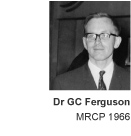 Multiple oral examinations were going on simultaneously in the Great Hall. One of my examiners pointed to another, rather elderly examiner on the other side of the hall. He had a pronounced kyphosis and I thought I would be asked what was the matter with him and I decided to say ankylosing spondylitis. However, my examiner then pointed to a portrait on the wall above and said: “That is of his grandfather named Gibson, who described a physical sign. What is it?” I had no idea and was not enlightened at the time. On return to my base in Dundee none of my contemporaries and few of my seniors knew the answer: the machinery murmur of patent ductus arteriosus ‘Gibson’s murmur’, which has naturally stuck in my memory ever since. How eclectic the exam was then compared with today. Multiple oral examinations were going on simultaneously in the Great Hall. One of my examiners pointed to another, rather elderly examiner on the other side of the hall. He had a pronounced kyphosis and I thought I would be asked what was the matter with him and I decided to say ankylosing spondylitis. However, my examiner then pointed to a portrait on the wall above and said: “That is of his grandfather named Gibson, who described a physical sign. What is it?” I had no idea and was not enlightened at the time. On return to my base in Dundee none of my contemporaries and few of my seniors knew the answer: the machinery murmur of patent ductus arteriosus ‘Gibson’s murmur’, which has naturally stuck in my memory ever since. How eclectic the exam was then compared with today.
Dr GC Ferguson, FRCP Edin |
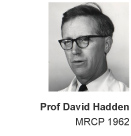 About ten years after passing my MRCP exam, having attained the consultant grade, and not so very long after being elected to the FRCP Edinburgh and becoming the local Advisor for the College, I was very surprised but basically pleased to be asked to be an examiner in what was now a single part general medical MRCP(UK) examination. So I went and bought a new overcoat and booked into the Roxburghe Hotel in Charlotte Square at College expense. About ten years after passing my MRCP exam, having attained the consultant grade, and not so very long after being elected to the FRCP Edinburgh and becoming the local Advisor for the College, I was very surprised but basically pleased to be asked to be an examiner in what was now a single part general medical MRCP(UK) examination. So I went and bought a new overcoat and booked into the Roxburghe Hotel in Charlotte Square at College expense.
On arriving in the snow the next morning at the Deaconess Hospital for the clinical cases I was greeted by a hall porter in full uniform, and asked politely to step inside his little box and wait a few minutes. After at least ten minutes I could stand it no longer and made my way upstairs where I found the assembled team of my prospective co-examiners involved in deep and serious discussion, while the porter and another person stood by bemusedly.
It transpired that the senior examiner had been warned that one of his team (myself) was rather young, and as he did not know me personally he had kindly asked the hall porter to look out for me and bring me up. The hapless porter had identified a suitably dressed young person arriving a little early and had conducted him up and presented him to the other examiners, who without any form of identity check welcomed him warmly and proceeded to show him round the assembled minor cases. It was some time before the penny dropped – the candidate thought this was uncommonly generous of the examiners, and they had only realised their error shortly before my appearance at the top of the stairs. As a new boy, I took no part in the subsequent damage limitation exercise, but did my bit in the regular conduct of the examination. It is just as important to identify the examiner as it is to identify the candidate!
Professor David Hadden, FRCP Edin |
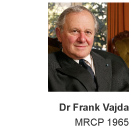 I remember most vividly the long cases. The general medical examination was held in Glasgow. I received a half crown to pay for the train ticket. I cherished it and still have that half crown to this day. I remember most vividly the long cases. The general medical examination was held in Glasgow. I received a half crown to pay for the train ticket. I cherished it and still have that half crown to this day.
The patient had multiple problems, including jaundice and a cardiac lesion, probably mitral stenosis. I was able to make the correct diagnoses, in spite of immense difficulties in coping with the Glasgow accent. In later years, talking about language, I lightheartedly said that I could not understand a word the patient spoke.
The long neurological case was held in Edinburgh. As my name was alphabetically at the end of the list of about six candidates to be examined I was the last candidate. Professor John Marshall, the famous Edinburgh neurologist, was my examiner. There were several factors in my favour. The examination was very tiring for both examiner and the candidate, and as the timetable was running late, I had more than an hour to think about my case, whereas the examiners were exhausted by the morning’s work. I had a very sympathetic supervisor, the person introducing the candidates and he asked me a question: “Is there any relation between the two lesions you had discovered?” I said no. He said, “That is right”. This gave me boundless confidence and I remember this colleague’s name with gratitude – of course I would not divulge it! The patient had motor neurone disease and a thyroid lesion and I managed to have a sensible approach to management.
The short cases and vivas went well, except when confronted by two neurosurgeons at the last hurdle, who quizzed me about cerebrospinal fluid dynamics, a question I apparently failed to answer correctly on the written paper and probably also on the oral.
I was sure I had failed. I was mortified and decided that it was the end of my academic career. I did not attend the publication of results, nor the farewell function and booked my ticket. I felt my path to specialisation in medicine was over and I was resigned and miserable. Then a telegram arrived from a friend in Edinburgh. “Passed.” I was so overjoyed I embraced and kissed passionately the elderly Nigerian lady who delivered the telegram!
Dr Frank Vajda, FRCP Edin |
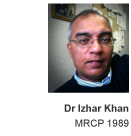 In the good old days, before the rigour and objectivity of PACES, when examiners held a free reign over what questions they wished to ask candidates sitting the oral exam for Membership I recall an instance which still does not fail to amuse me. The candidate, of a Far Eastern appearance, had done rather well until it came to the contrived question of “the ethical dilemma” (more senior examiners from years past will recall this now defunct but once important component of the oral exam). In the good old days, before the rigour and objectivity of PACES, when examiners held a free reign over what questions they wished to ask candidates sitting the oral exam for Membership I recall an instance which still does not fail to amuse me. The candidate, of a Far Eastern appearance, had done rather well until it came to the contrived question of “the ethical dilemma” (more senior examiners from years past will recall this now defunct but once important component of the oral exam).
I presented the candidate with the oft-used scenario of a father who refuses to allow his child a blood transfusion, because of his beliefs as a Jehova’s witness. The candidate replied without a moment’s reflection that “Sir, in my country the father would immediately be thrown in prison”, thus bringing my moral dilemma to a surprisingly swift conclusion!
It was the one instance I recall where the examiner rather than the candidate was left at a loss for words.
Dr Izhar Khan, FRCP Edin |
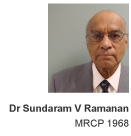 Four decades ago, I visited the Royal College of Physicians. I did not meet the President. I met instead twelve ogres disguised as examiners, six in medicine and a like number in haematology. Ostensibly, they were there to assess my clinical competence. My own perception was that I had entered an obstacle race, and would win only if I jumped all twelve hurdles. Four decades ago, I visited the Royal College of Physicians. I did not meet the President. I met instead twelve ogres disguised as examiners, six in medicine and a like number in haematology. Ostensibly, they were there to assess my clinical competence. My own perception was that I had entered an obstacle race, and would win only if I jumped all twelve hurdles.
For the long case, the examiner led me to a patient lying comfortably in bed, and our discussion went something like this:
“This gentleman was anaemic when we admitted him to hospital. We prescribed some tablets and his anemia has improved considerably. What might we have given him?”
“An iron compound or folic acid.”
“Yes, true, true. Any other thoughts?”
“Well, he could have had a pyridoxine responsive anemia that did respond to tablets of the vitamin.” (This was, after all, a specialty postgraduate examination.)
“That, of course, is a possibility, although it is a rare condition. Would you please examine his abdomen?”
Under the examiner’s observant eye, I examined the patient’s abdomen. The striking finding was an easily palpable firm liver and spleen, with no signs of free fluid. I saw no spider angiomas suggestive of portal hypertension.
“Would you care to revise your therapeutic opinion?” the examiner asked.
I now had to come up with a diagnosis that would explain hepatosplenomegaly. Lymphomas are not treated with oral medications, and so this diagnosis was rapidly dispelled. There then remained a chronic leukaemia, myelogenous or lymphatic, but which one? Fortunately, my abdominal examination had included palpation of the groins, and detecting no inguinal lymph gland enlargement, I opted for chronic myelogenous leukaemia as the more likely diagnosis. “I believe the tablet was Busulfan,” I responded, indicating the treatment then used for this illness. With a grunt that I hoped indicated approval (one never knows), we moved on to the next patient.
“Did you visit the Castle?” someone asked me when I returned to London.
“Castle? What castle? Where?” I replied.
Edinburgh Castle, situated in the heart of the city is almost impossible to miss, but I succeeded in doing so. Two months later, the postman brought me a letter with the College shield embossed on the envelope. The missive did not say “Wow! You’ve passed!” but in a crisp and matter-of-fact manner indicated that I had satisfied the examiners and was now eligible for Membership of the Royal College of Physicians of Edinburgh.
A few months ago, I visited the College for the second time. On this occasion, I did meet the President. On my first visit, the concrete lions adorning the doorway had scowled at me. They appeared to have mellowed with age, for a benevolent smile greeted me as I entered the portals of the venerable institution. In the President’s chambers, that dignitary warmly greeted me. By previous appointment, I had arranged for the “Signing of the Roll”, a requirement expected of all Fellows. At this visit, I did see Edinburgh Castle.
Dr Sundaram V Ramanan, FRCP Edin |
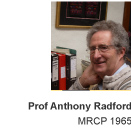 In my first short case I was horrified to see a patient whom I had seen in the ward of the Edinburgh Infirmary. (Throughout the year registrars and consultants are constrained upon ‘to dig up suitable patients’ which can be used as illustrative of this or that for examination purposes.) My heart sank as I had used this lady as a test long case in the ward not long earlier and at that stage they had no idea what was wrong with her. In my first short case I was horrified to see a patient whom I had seen in the ward of the Edinburgh Infirmary. (Throughout the year registrars and consultants are constrained upon ‘to dig up suitable patients’ which can be used as illustrative of this or that for examination purposes.) My heart sank as I had used this lady as a test long case in the ward not long earlier and at that stage they had no idea what was wrong with her.
“Excuse me, Sir, but I cannot in all honesty see this patient as I have used her as a long case in the ward.”
“Ah, thank ye kindly, laddie, I admire your honesty, maybe you should have a look at this laydee.”
The chances just had to be better – and they were. I guessed the blood slide correctly and was given no ECG to read. Someone must be looking after me, I thought.
Then there was ‘the-what-am-I-thinking’ game. It started with the usual polite introductions of “Now where would ye be from, laddie”.
“From Papua New Guinea, Sir.”
“So, what are you doing up from West Africa?” No response to that question.
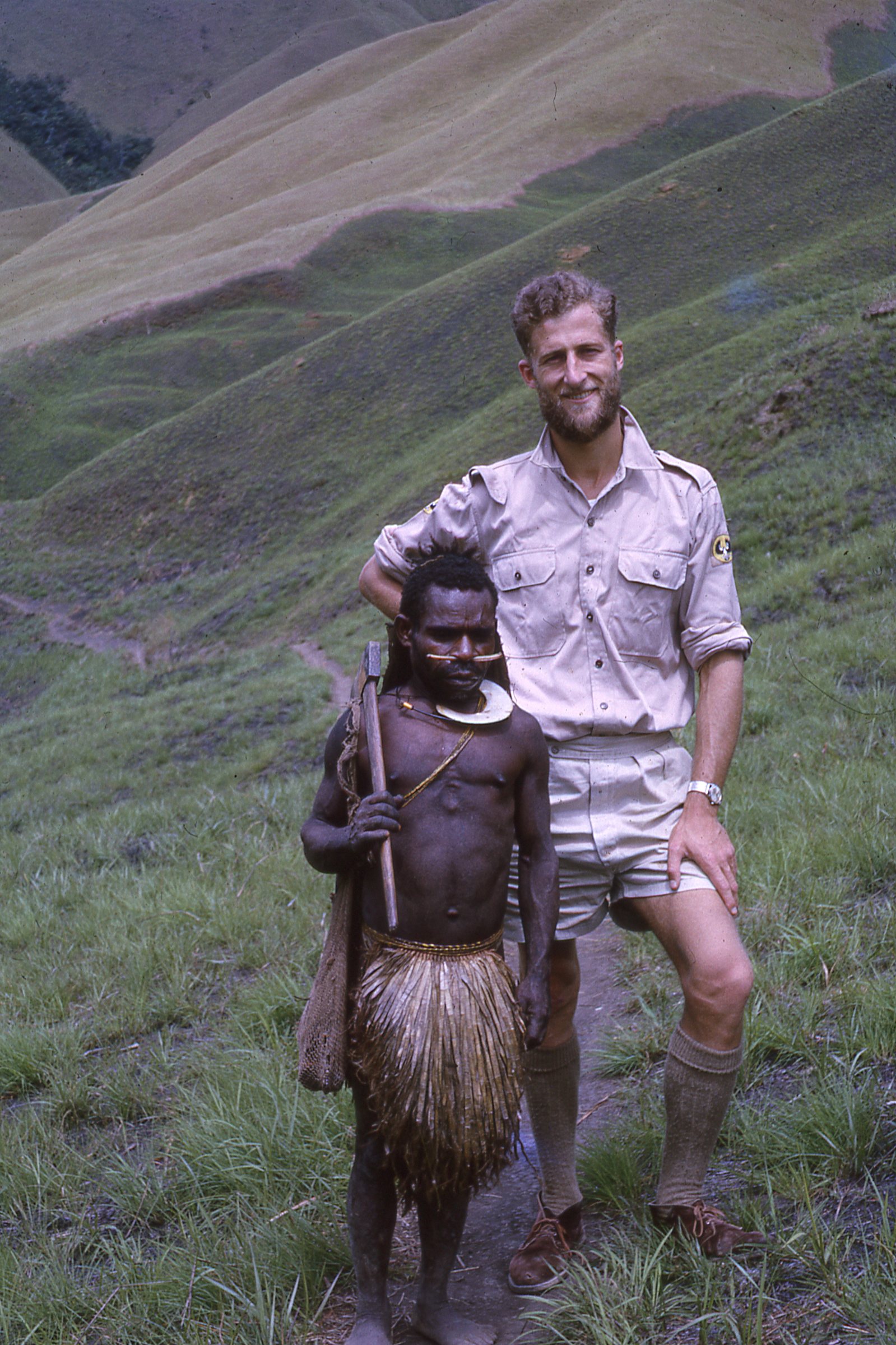 “Well, actually I am from the Pacific Guinea.” “Well, actually I am from the Pacific Guinea.”
His colleague, wishing to recover ground asks, “And what is the most important medical discovery to come out of New Guinea?” Now what indeed!
“Perhaps the discovery of kuru, the neurological disease, caught by eating the brains of the dead?”
“Naw, laddie, it only occurs there.” I did not add, but could have “ but it will lead to two Nobel Prizes in Medicine or Physiology”. Try again.
Perhaps, “Pigbel – Enteritis necroticans – a kind of food poisoning which follows eating partly cooked pig meat several days old contaminated by soil.”
No? I was fast running out of potential candidates.
“Well, perhaps the use of injectable iodised oil in mothers to reduce the occurrence of endemic cretinism?”
No? I am getting to the bottom of my barrel and to the end of my tether.
“Eh, perhaps the immunisation of mothers with tetanus toxoid, and the subsequent transplacental passage of antibody to their babies, thus preventing neonatal tetanus.”
“Yeerse laddie, surely one of the greatest public health discoveries of the century.”
Pheew! I passed.
Professor Anthony Radford, FRCP Edin |
Experiences / Reminiscences / Memoirs
|